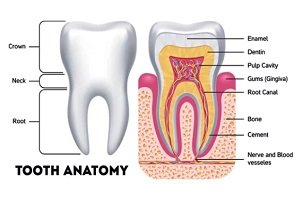Understanding Teeth Sensitivity
Dentinal hypersensitivity or tooth sensitivity is a common dental problem. Most sufferers are between 20 and 50 years old



Tooth sensitivity occurs when the layer of a tooth underneath the enamel (called the dentin) or the layer covering the root (called cementum) is exposed along the gum line due to receding gums. The exposed areas respond to hot and cold and sometimes too sweet and spicy foods and trigger pain. Thousands of microscopic channels run through the dentine towards the centre of the tooth. Once the dentine is exposed, external triggers (such as a cold drink) can stimulate the nerves inside the tooth, causing the characteristic short, sharp sensation of tooth sensitivity.
Enamel wear e.g. from tooth grinding or frequent tooth brushing
Gum recession e.g. from gum disease or aggressive brushing with hard bristle brush
The sensitivity which can be experienced during and after professional tooth whitening (bleaching) treatments is different from dentinal hypersensitivity.
Enamel is the thin outer covering of the tooth. This tough shell is the hardest tissue in the human body. Enamel covers the crown which is the part of the tooth that is visible outside of the gums. Although it’s harder than any other substance in the body, over time it can gradually wear away to expose the dentine beneath, which may lead to tooth sensitivity.

Bruxism is a condition in which you grind, gnash or clench your teeth. If you have bruxism, you may unconsciously clench your teeth when you’re awake (awake bruxism) or clench or grind them during sleep (sleep bruxism). It is basically non-functional grinding of teeth, which over time can expose the underlying dentine.
Dental erosion is the loss of the surface of your teeth due to acids you eat or drink or acids coming up from your stomach. These acids can dissolve the crystals that make up your teeth, leading to tooth surface loss.
Acidic foods and drinks include fruit and fruit juices, carbonated drinks, black coffee or tea, wine, and anything that tastes sharp such as ketchup or salad dressing. As few as four acidic ‘challenges’ throughout the day can put your enamel at risk from acid erosion, also known as acid wear.


If you brush too frequently or too hard, eventually your tooth enamel may be worn away or you could develop receding gums.
To prevent this ask your dentist for advice on the best tooth brushing technique and oral hygiene routine for you and try using a soft-bristled toothbrush.
Healthy gums are essential for healthy teeth. Gum recession is one of the leading causes of tooth sensitivity. Overly frequent or aggressive tooth brushing, long term gum disease (gingivitis or periodontal disease) and even ageing can contribute to gum recession. As the gums recede, the underlying dentine can gradually become exposed over time and may lead to tooth sensitivity.

Sensation caused by tooth decay can feel similar to tooth sensitivity. Tooth decay happens when the sugars in foods and drinks react with the bacteria in the plaque on our teeth to form acids. These acids can gradually soften and dissolve your enamel and dentine exposing pulp, which causes tooth sensitivity.
The problem with tooth decay is that you might not feel any sensation from it until it’s quite advanced. It can be managed in the early stages. So, even if you don’t feel any sensation, it’s important to go for regular dental checkups so that your dentist can spot early signs of tooth decay and work with you to manage it.
It is not uncommon for your teeth to feel sensitive for a time after having dental treatment. However, if this persists contact your dentist for advice.
Other common causes of tooth discomfort include dental abscesses and cracked or fractured teeth. It is important to visit your dentist regularly to check the health of your teeth and gums. If you feel any discomfort, particularly if it persists, contact your dentist for advice.
If you’ve ever winced after an unwelcome sensation of tooth sensitivity, you’re not the only one. But remember, there can be many different causes of dental sensation, other than tooth sensitivity. So if you are feeling any discomfort, especially if it persists, the best thing you can do is visit your dentist and seek professional advice.
Please remember there are many other causes of dental sensation than tooth sensitivity. If you feel discomfort in your teeth at any time, we recommend you visit our best dentist in Jamnagar to ask for advice as soon as you can. We recommend that you visit our best dentist clinic in Jamnagar every 6 months for regular dental checkups.
After discovering you have tooth sensitivity, it’s a natural next step to want to know what you can do about it. Visit our best dental clinic in Jamnagar and talk to our expert dentists about what has caused you to have this problem, what you can do to relieve it and how to help prevent it from getting worse. Our best dentists in Jamnagar can advise you on the most suitable oral care routine for someone with sensitive teeth, the best tooth brushing technique for you, how often and when. In addition, you can relieve the sensation of tooth sensitivity by changing your regular toothpaste to a daily use toothpaste specially formulated to care for sensitive teeth.
Only a dentist can confirm you have dentinal hypersensitivity. If you are experiencing any dental problems, always visit our best dental clinic in Jamnagar and consult our dentists for advice. They can advise you on the most suitable oral care routine for you, and the best tooth brushing technique, how often and when. If you feel you are at risk of acid wear, talk to our best dentists in Jamnagar for advice, for example, on how best to consume the many acidic foods and drinks in the modern diet. You can also try toothpaste specially formulated to help protect teeth against acid erosion.
The sensitivity which can be experienced during and after professional whitening procedures is different from dentinal hypersensitivity. Dentinal hypersensitivity is a common condition of the teeth which can arise when the dentine of the tooth becomes exposed (typically as a result of gingival recession or tooth wear). However, in the case of whitening treatments, the bleaching component of the treatments is believed to penetrate the tooth, reaching dentine and causing sensitivity.
Clinical studies indicate that toothpastes containing potassium nitrate can reduce the sensitivity associated with professional whitening procedures. In these studies, subjects using toothpaste with potassium nitrate for two weeks prior to and during whitening treatment experienced less sensitivity post treatment, compared to those using a regular fluoride toothpaste.
Speak to your dentist about bleaching-related sensitivity if you are considering having a tooth whitening treatment.
If you feel discomfort or twinge in your teeth at any time, we recommend you visit our dental clinic in Jamnagar to seek advice as soon as you can. Please remember there are many other causes of dental discomfort than tooth sensitivity.
Only a dentist can confirm you have dentinal hypersensitivity. If you are experiencing any dental problems, always consult dentist for advice. If you have dentinal hypersensitivity, we can help to minimize further exposure of the dentine, care for your sensitive teeth and relieve the symptoms by making some simple changes to your daily oral care routine and dietary habits.
Our expert dentists can spot the early signs of tooth wear so it’s important to go for regular dental checkups. If you think you might be at risk of enamel wear, visit our dental clinic and consult our best dentists in Jamnagar.
Perfect Dental® is the best dental clinic in Jamnagar and our team of specialist doctors is highly skilled and experienced best dentists in Jamnagar. We have a highest success rate of 97%.

Dr. Chandani
Doctor
Dr. Chandani
Hey, how can I help you today?
Powered by Elementor